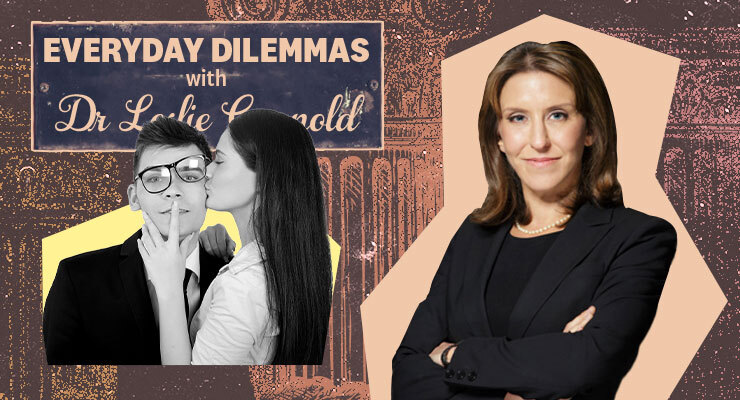
In Everyday Dilemmas, Dr Leslie Cannold uses her ethical training to help solve your problems. Send your questions to letters@crikey.com.au with “Dear Leslie” in the subject line. She might even reply…
Dear Leslie,
My boss just got sacked because someone dobbed about our romantic relationship. I know the policy said he should have told HR, but I didn’t want that (I just knew everyone would think my recent promotion was because we were together). But now he’s lost his job because of me and everyone’s talking behind my back. It’s a shit-show and totally overblown. If one more person asks me if I’m OK like I’ve been abused, I’m gonna explode!
Not a Victim, Melbourne
Dear Not a Victim,
What a turbulent and upsetting time for you. I hope you’re looking for support outside the office, from family and friends. You may also need employment advice if you’re unsure if all the shoes have dropped.
I get the sense that you’re over 18 and that, despite the power differences between you and your boss, the relationship was consensual. I’m going to proceed on that basis, though it strikes me that if I’m wrong this could explain the “poor you” vibe coming from those who see you as a victim of sexual harassment.
If you’re not, the reason your boyfriend is in strife comes down to abuse of power and conflict. You’re right that his seniority meant that, unlike you, he had less discretion about disclosing your romantic relationship. This is because, according to workplace consultancy Worklogic, “the more senior an employee, the more likely [he or she is to be] involved in decisions that affect the other employee in the relationship, and the greater the likelihood of perceptions of conflict of interest”.
In other words, your boyfriend had the power to hire or fire you and while he may not have abused that power, he could have done — a risk that would have been reduced if the relationship was registered.
The shame is that if your partner had disclosed the relationship to HR, they would have been required to keep this information and any mitigation strategies they put in place confidential. This means that when the word of your relationship got out, your boyfriend’s job would have been protected and — thanks to the mitigation strategies in place — your professional reputation would be preserved, too.
But what’s done is done. What matters now — if you want to keep your job — is to move the conversation on. You could send a hardcopy note around with a non-sensational recitation of the facts (including whether the relationship was consensual) and any explanations or expressions of regret you wish to provide, before asking your colleagues for understanding and privacy. Or, if this will just fuel the fire, take enough time off to let the caravan move on.
I hope it works out,
Leslie
Dear Leslie,
I have worked hard building my business and last year forced a buyout from my partner. I made enough to never have to work again.
My sister is an artist and never has any money, though she’s been pretty good at wasting what Dad has given her over the years. Now he wants to change his will so she’ll get what little he’ll leave, because I don’t need it.
This is so unfair. Especially for my daughters, who deserve every cent of what I was going to give straight to them. But when I told a friend over the weekend, I could tell he thought I was being greedy.
Do you think so?
Frugal in Erkinville
Dear Frugal,
Congratulations on becoming independently wealthy. Not everyone who’s worked hard reaps this reward, though certainly no one who doesn’t ever will. You’ve done well.
Your conundrum puts us in the land of what ethicists call supererogation, or paying above what is morally required. If you walk past a burning building, you’re not morally obliged to rush in to save those trapped inside — but you’ll be hailed as a hero if you do. Your doctor owes you a certain standard of care — but if she offers to donate her kidney to save your life, that’s beyond the call of duty.
In other words, while it would be kind and generous for you to support your father’s wish to leave his small estate to your sister, you’re not morally obliged to do so.
Remember that family fights over money are often conflicts over emotional transactions that are harder to quantify: money as a measure of love (does Dad love me less if he leaves my sister everything?); money as a measure of “just desserts” (why should she get it all because she chose to have a poverty-inducing career?).
Recognising this may help you separate the financial consequences of honouring your father’s last wishes and the emotional ones — and to seek reassurance from your dad before it’s too late.
I hope it goes well,
Leslie








I was once a witness in a coroner’s inquiry arising from the suicide of a neighbour. My deceased neighbour was constantly angry with his father who had left the bulk of his estate to my neighbour’s sister. The father had lived with his daughter and her family. Both father and son had had seriously compromised mental health and many problems arose from their shared inability to understand other people’s different view points.
The coroner remarked that he had seen more problems arising from wills that left estates unequally shared between family members than he could count.
If the father had lived with his daughter and her family for many years, I can understand that he would choose to have an imbalance in the will.
Hard work is not necessary for becoming independently wealthy. The outcomes of businesses are determined to a greater or lesser extent by luck. Your sister would also become more or less wealthy by luck too, although there may be good reasons as well for why their father chose to leave his money to the sister. We simply don’t know enough from what the brother says but it is essential that he ask his father what his reasons were for giving his money in his will to the sister.
Why do the person’s daughters ‘deserve every cent’ of what was going to be given to them? Why are the daughters more worthy than the sister? This is a really mean spirited letter. If the person’s father thinks that the daughters are so worthy that money should be left for them, then he would do so. This appears to be a small estate, and it is not unknown for rich people with a bone to pick to enter into litigation over small estates with the object of bleeding it dry so that the beneficiary is left without anything. Here’s hoping the father words his will very well.